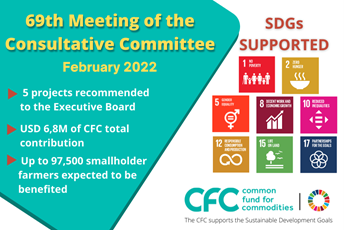The CFC holds its 69th Consultative Committee Meeting by Teleconference
The Common Fund for Commodities held its 69th Consultative Committee (CC) Meeting via teleconference from 31 January to 3 February 2022. Five projects submitted under the 19th Call for Proposals were reviewed and eventually recommended for approval by CFC’s Executive Board (EB).
The Consultative Committee reviewed five regular project proposals. After thoroughly analyzing their feasibility and potential for long-term development impacts, all projects were recommended for future consideration and approval by the Executive Board. The Committee recognized the quality of the projects presented, appreciating the innovative elements and diverse commodities addressed.
The total value of these projects amounts to USD 36,000,000, of which the CFC would contribute USD 6,800,000 under the form of loans. These projects are based in Colombia, the United Kingdom, Singapore, Burkina Faso, Guinea, Guinea-Bissau, Senegal, Tanzania, Uganda, Zambia, of which the last seven are Least Developed Countries (LDCs). The projects cover commodities such as dairy, cashew nuts, sesame seeds, cotton, and lime.
As the CFC is committed to contribute to the Sustainable Development Goals (SDGs), these projects target not only the CFC core SDGs – SDG 1 (No poverty), SDG 2 (Zero Hunger), SDG 5 (Gender equality), SDG 8 (Decent work and economic growth), SDG 10 (Reduced inequalities) – but also SDG 12 (Responsible consumption and production), SDG 15 (Life on land), SDG 17 (Partnerships for the goals). Specifically, around 97,500 smallholder farmers are expected to benefit from these projects.
Given the challenges that the smallholders and SMEs in the developing world have been facing, Ambassador Sheikh Mohammed Belal, Managing Director of the CFC urged all to consider drawing more resources so that enough financial support could be extended to victims of pandemic. Ambassador Belal also highlighted the activities that CFC undertook to form the Emergency Liquidity Facility (ELF) to provide support to the smallholders and SMEs. The year 2021 indeed experienced the highest amount of disbursements since the CFC’s reform in 2012. Also, during the year the CFC approved financing of 11 projects with an outlay of USD 114.3 million, to which the CFC contributed USD 18.9 million.
Amb. Belal thanked the CFC staff members for their efforts to upscale projects and appreciated them for their achievements. Yet, it was noted that more support is still needed to meet the demands of SMEs and smallholders in the developing world. He thus elaborated on the Commodity Impact Investing Facility (CIIF), a new instrument to attract impact investors to finance the projects identified and managed by the CFC. It is worth mentioning that the final report of the Working Group on Sustainable Fund Management was approved by the Governing Council during its 33rd Meeting, authorizing the Managing Director to take the necessary steps to establish the CIIF. More information on the CIIF can be found here.
Attention was paid to the inequalities surrounding commodity trade, particularly to the fact that some re-exporting countries despite not producing coffee, cocoa or for that matter any commodities, yet sometimes earn over three times more from the exports of coffee products than the producing countries. Amb. Belal thus called for more action to support smallholders and SMEs, who are the backbone of virtually every economy in the world. More international support mechanisms need to be worked out to provide cheaper finance the smallholders and SMEs, where women and youth should be given priority. Green recovery is instrumental in this process, and it must begin by acknowledging that the current structure of global economic organizations is inadequate for developing countries. A constructive review based on equity, sustainability and collective prosperity is therefore required.
In addition to the project reviews, the Consultative Committee also deliberated on the operations of the CFC, including the project pipeline, Impact Portfolio Management, Loan Portfolio Management. The CFC Secretariat further gave an update on the ongoing work of the Commodity Impact Investment Facility (CIIF).
This CC Meeting can be considered a success given the quality of projects presented and approved, reflecting the CFC’s constant efforts to innovate and create deeper socioeconomic impacts. The diversification in commodities and SDGs addressed reassures the importance of embracing technological developments and partnerships to create resilient value chains – especially in LDCs – to move towards green recovery.
The CC is composed of nine independent experts in a specific commodity or subject matter area, and is an advisory body for the Executive Board of the CFC. Members of the CC provide the CFC with their expertise to identify best projects to be recommended to the Executive Board. The CC is composed of five women and four men, hence reflecting the CFC’s commitment to gender equality. The meeting was chaired by Ms. Jie Chen for the third time.

